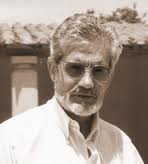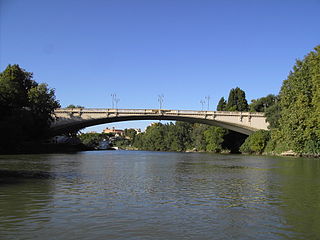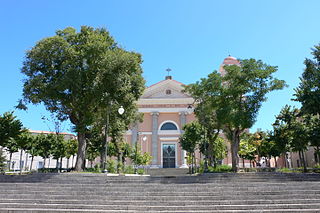Related Research Articles

Grazia Maria Cosima Damiana Deledda, also known in Sardinian language as Gràssia or Gràtzia Deledda, was an Italian writer who received the Nobel Prize for Literature in 1926 "for her idealistically inspired writings which with plastic clarity picture the life on her native island [i.e. Sardinia] and with depth and sympathy deal with human problems in general". She was the first Italian woman to receive the prize, and only the second woman in general after Selma Lagerlöf was awarded hers in 1909.

Nuoro is a city and comune (municipality) in central-eastern Sardinia, Italy, situated on the slopes of Mount Ortobene. It is the capital of the province of Nuoro. With a population of 36,347 (2011), it is the sixth-largest city in Sardinia. Its frazione (borough) of Lollove is one of I Borghi più belli d'Italia.

Sardinian or sard is a Romance language spoken by the Sardinians on the Western Mediterranean island of Sardinia.
Sardinia is probably the most culturally distinct of all the regions in Italy and, musically, is best known for the tenore polyphonic singing, sacred chants called gosos, the launeddas, an ancient instrument that consists of a set of three single-reed pipes, all three mouth-blown simultaneously using circular breathing, with two chanters and one drone and the cantu a chiterra, a monodic song that is accompanied by guitar, widespread mainly in the center and north of the island.

The Sardinians, or Sards, are a Romance language-speaking ethnic group native to Sardinia, from which the western Mediterranean island and autonomous region of Italy derives its name.

The Perfect Fusion was the 1847 act of the Savoyard king Charles Albert of Sardinia which abolished the administrative differences between the mainland states and the island of Sardinia within the Kingdom of Sardinia, in a fashion similar to the Nueva Planta decrees between the Crown of Castile and the realms of the Crown of Aragon between 1707 and 1716 and the Acts of Union between Great Britain and Ireland in 1800.
Nicola Tanda was an Italian philologist and literary critic. He studied under Ungaretti and Sapegno at Rome. He was for over thirty years professor at the University of Sassari, first specialising in Italian literature, and then later in Sardinian philology and Sardinian literature. He was a leading advocate for minority languages and their literary expression in the island of Sardinia, including the Sardinian language and Algherese Catalan. As such he was an honorary member of ANPOSDI. He wrote the new Philology of Italians based on the European Charter for Regional or Minority Languages. He was founder and President of the Sardinian PEN Club. He was President of the jury of the Premio Ozieri literary prize founded in 1956 to promote new works composed in Sardinian tongues. He founded in 2003 the Centre for Study of Sardinian Philology. As an editor/director he has guided the publication of over 100 volumes written in Sardinian languages.

Giulio Angioni was an Italian writer and anthropologist.
Filindeu is a rare pasta from the Barbagia region of Sardinia. It is made by pulling and folding semolina dough into very thin threads, which are laid in three layers on a tray called a fundu and dried to form textile-like sheets. The dried sheets are broken into pieces and served in a mutton broth with pecorino cheese. Filindeu is listed on the Ark of Taste.
Giovanni Lilliu, was a renowned archeologist, academician, publicist and politician and public figure and an expert of the Nuragic civilization. Largely due to his scientific and archeologic work in the Su Nuraxi di Barumini in Sardinia, Italy, the site was inscribed on the UNESCO list of World Heritage Sites in 1997.

Ponte del Risorgimento is a bridge that links Piazzale delle Belle Arti to Piazza Monte Grappa in Rome (Italy), in the Flaminio and Della Vittoria quarters.
Sardinian Literary Spring is a definition of the whole body of the literature produced in Sardinia from around the 1980s onwards.

Ponte Regina Margherita, also known as Ponte Margherita, is a bridge linking Piazza della Libertà to Lungotevere Arnaldo da Brescia, in the rioni Campo Marzio and Prati in Rome, Italy.
Domenicangela Lina Unali has been professor of English literature at the Faculty of Letters, University of Rome Tor Vergata since 1983. Previously, from 1969 to 1982, she taught at the University of Cagliari. She was Secretary and Treasurer of AISNA in the years 1971-1973.

Sebastiano Satta was an Italian poet, writer, lawyer, and journalist.
Anonima sarda is an Italian journalistic expression widely used by the Italian media as an umbrella to describe the Sardinian groups operating kidnappings for ransom, which took place for the most part in the Mediterranean island of Sardinia between the 1960s and 1997.
The Istituto superiore regionale etnografico is an institution based in Nuoro (Sardinia), established in 1972 by the Regional Council of Sardinia.
The gosos or goccius (Sardinian) or goigs (Catalan) are a kind of devotional and paraliturgical songs sang pertaining to the folk tradition that are dedicated to the Virgin Mary, Jesus Christ, or a saint. They are typical of the Catalan Countries and Sardinia, and written in the Catalan, Sardinian or Spanish languages. They are sung during religious ceremonies, processions, pilgrimages and the votive festivals.
Shigeaki Sugeta is a Japanese linguist. Emeritus professor of General, Romance and Italian Linguistics at the University of Waseda, and now advisor to the Institute of Italian Studies of the same university, is the author of the first ever Sardinian-Japanese vocabulary.

Frà Antonio Cano (1779–1840) was a sculptor, architect, and lay friar of the Kingdom of Sardinia.
References
- ↑ "La madrina degli sciamani" (in Italian). La Nuova Sardegna. Retrieved November 13, 2014.
- 1 2 "Il personaggio 2011: Dolores Turchi" (in Italian). Sagra del Mirto. Archived from the original on November 13, 2014. Retrieved November 13, 2014.